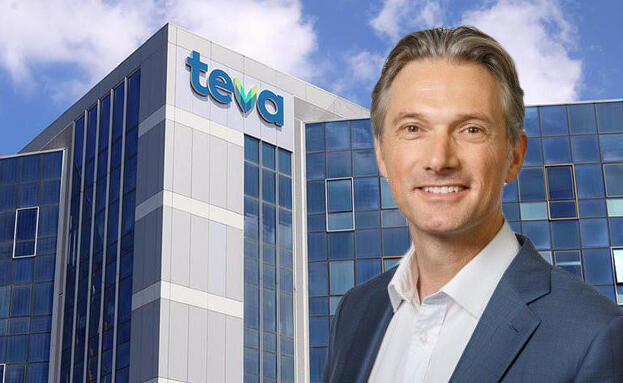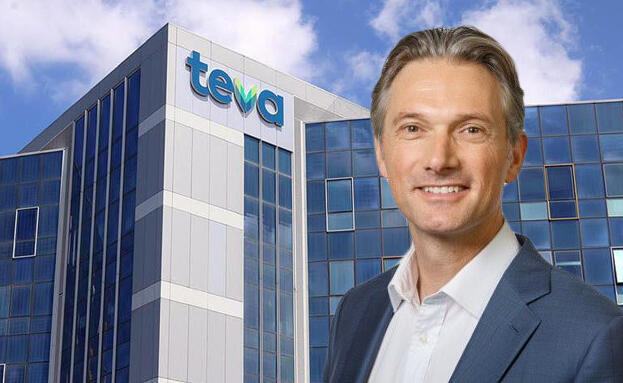
Schultz kept Teva away from the abyss, but couldn't find a runway to growth
Kare Schultz, who served as CEO of the pharmaceutical company for the past five years, has left the company a year early after amassing a salary of more than $100 million. His replacement, Richard Francis, is taking over with less debt and less legal issues, but with the big challenge of creating new growth engines
Exactly five years after assuming the position of CEO of Teva, Kare Schultz is leaving the company and will be replaced by a relatively unknown CEO, Richard Francis. There are a number of unusual things in the appointment announcement that Teva sent out yesterday afternoon. Although Schultz informed the Teva board of directors last spring that he did not intend to renew his contract ending in November 2023, he has decided to leave now, a year before the end of his contract. In addition, although there was talk of it, Schultz will not remain in the company as a director.
Even though Schultz was not well known in Israel, he was relatively well known in the global pharmaceutical market, especially in Europe, and was regarded as the one who led a number of important processes in the two large pharmaceutical companies he headed: Novo Nordisk and Lundbeck. The new CEO does indeed come with 25 years of experience in the pharmaceutical industry, including five years as CEO of Sandoz, the generics division of the Swiss pharmaceutical giant Novartis, which is considered one of Teva's main rivals. However, he is a fairly young manager who doesn't have a track record of reviving companies. Moreover, the circumstances of his departure from Sandoz are shrouded in fog and at the time of his departure it was said that it was for "personal reasons". After leaving the position, Francis joined an investment fund focused on medical companies and in the last year served as CEO of two startups at the same time.
Francis received a three-year contract and it includes an annual salary of $1.6 million, not including annual bonuses that can reach a maximum of 200% of his annual salary. He will also receive a capital grant of $9 million in restricted shares. Francis's signing bonus is $5 million in cash and will be paid in three installments: $1.5 million upon entering the position, $1.5 million a year later and $2 million in his third year at the company. Francis will also receive an additional $5 million in blocked shares. Beyond that, he will be entitled to relocation and housing expenses if he decides to move to Israel.
Although this is a generous package, it is significantly more modest than that of Schulz who received a signing bonus of $20 million in cash and another $13.5 million in options and restricted shares of Teva. Over the years, Schultz was highly compensated, but on the other hand, most of the capital component was in options that remained out of the money in view of the continuous fall in Teva shares during his tenure. For 2022, Schultz is supposed to receive a compensation package of approximately $15 million, similar to the last two years, but this time it will also include compensation and other settlement items, following the termination of the contract a year earlier than planned. Together with the compensation clauses, which may amount to $30 million, Schultz's total compensation during his time at Teva will reach over $100 million. According to the contract, Schultz is entitled to compensation of $1.2 million, a payment of $4 million for a non-compete clause and another capital component that should reach $24 million following vesting.
The battle to become Teva's new CEO was contested by a number of senior executives. According to estimates, these were mainly the VPs that Schultz himself brought to the company with the promise of future promotion. One of the candidates for the position of CEO could have been Tal Zaks, the former Chief Scientist of Moderna, which brought the Covid vaccine to the world at the same time as Pfizer. Sachs joined the Teva board of directors last year and could have followed the usual route of getting to know the company first as a director before moving to the CEO's chair. There were also Israeli managers outside of Teva who wanted the position, but the pharmaceutical company decided to go for someone who would not have a particularly emotional connection to Teva as an Israeli institution.
The 54-year-old Francis, who will be Teva's youngest CEO since Eli Hurvitz, currently lives in London and will probably not relocate his residence to Israel, but will come here often. At Teva, according to company guidelines, there is a vague obligation to "manage the company from Israel", but sources at the company stated that residence in Israel was not a condition. Schultz, who arrived five years ago from Denmark, lived in Jaffa, but recently said that since he is over 60, and that his first grandchild is due to be born soon, he wants to return to his homeland.
However, beyond the sentiment and emotions, it seems that Schultz mostly understood what is quite clear from Teva's performance recently: he managed to pull the company off the edge of the abyss on which it stood after the giant purchase of Actavis for $40 billion through a debt of $30 billion, but on the other hand, there are no runways in sight that will enable the company to grow. After the close of the opioids affair that had plagued Teva roughly since he took office, Schultz felt that it could only go downhill from here. And that will be the main challenge for the young Francis: to convince investors that Teva has a future, and not just a glorious past.
As soon as he took office, Schultz began to implement a broad cutback plan that only someone coming from outside - not only from outside Teva, but also from outside Israel - would be able to implement. It suddenly became clear that the darling of the Israeli economy, which was also considered an extraordinary integrator of acquisitions, fell asleep in maintaining its spending structure. This was made possible thanks to the enormous profits of Copaxone, the first original drug to come out of Israel, intended for the treatment of multiple sclerosis. Schultz fired a quarter of Teva's employees in the world (more than a thousand jobs were cut in Israel), and factories around the world were closed or sold after it became clear that after each acquisition Teva left most things as they were and did not leverage the integration.
A year after he took office, it seemed that things were starting to improve and the stock even jumped by 50%, but then legal complications began to emerge. The most important of which was the opioids affair that practically overshadowed and clouded the bulk of Shultz's tenure. Along with many companies in the industry, an accusing finger was pointed at Teva by the American prosecution that drugs it marketed caused the addiction and death of many Americans. The affair lasted for about three years, during which time Teva was under the threat of high compensation costs that they would be required to pay and would not be able to meet due to their delicate financial situation. Schultz inherited a debt of $35 billion, which left him no room for maneuver to close a settlement with the American authorities. In the end, Schultz was able to sign a compromise arrangement under which Teva would pay "only" $4.3 billion and provide drugs for many years going forward. He also reduced the debt to "only" $19 billion.
While Schultz was busy reducing debt and removing legal clouds, the issue of future growth engines was not addressed, and this will be the main task for Francis. Today, Teva has two growing original drugs: Austedo and Ajovy, which compensate for the continuous decrease in Copaxone earnings. It has also launched a number of biosimilar drugs, sort of more sophisticated and more expensive generic versions, which are starting to take off, but the competition in their market is tough. As far as traditional generics are concerned, the sector that made Teva the largest company in its field, it hasn't registered any major success for a long time, and it is not clear at this stage which of the candidates will be the next blockbusters (drugs with an annual sales potential of over a billion dollars).
In order to get rid of the image of a company mired in legal and financial trouble, Teva must generate organic sources of growth as it still cannot afford to make acquisitions. What works in Francis's favor is his entry into Teva at a point where the legal cloud is behind it, the stock is close to a historic low and the global economy is facing a downturn - times when pharmaceutical company shares tend to become a relatively safe haven for investors.














